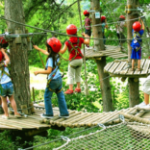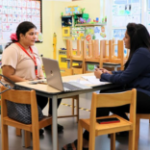A balanced curriculum for toddlers does not merely have to do with academics alone but takes a holistic view of the development of these babies. The growth stages they are in demand much care toward their emotional, social, cognitive, and physical skills that eventually lead them to their fruitful future. A curriculum far beyond reading and math leads children to develop well-rounded skills to become better versions of themselves.
The Importance of a Holistic Curriculum
A well-rounded curriculum that integrates different areas of learning helps toddlers thrive in all aspects of their lives. Balancing structured learning with free play, academic activities with creativity, and cognitive growth with emotional development makes children ready for the challenges that they will face as they grow.
1. Emotional and Social Development
Academic skills are essential, but children of this age must learn to control their emotions and engage with others. Emotional and social development can be achieved through activities that encourage cooperation, communication, and empathy. Group play, collaborative tasks, and opportunities to practice kindness and sharing help children understand the importance of relationships. Teaching a child how to express him or herself, to know his or her feelings, and to develop resilience in case of failure is a very important thing.
In role-play, story time, and circle time, activities teach toddlers to build emotional intelligence and social skills which they shall need for the rest of their lives.
2. Physical Development
Physical development is as important as intellectual growth. Toddlers should be physically active to strengthen muscles, coordination, and motor skills. A curriculum should be rich in physical activities through which children can experiment with gross motor skills like running, jumping, and climbing and fine motor skills like drawing, and building block configurations.
Outdoor play is also important because it allows toddlers to connect with nature and explore the surroundings in a safe, stimulating manner. Physical activities improve coordination and provide healthy habits and a love for exercising that can last a lifetime.
3. Encourage Cognitive Growth and Critical Thinking
Academic learning such as numbers, letters, and shapes will lay the basis for early education, but it must not fill the toddler’s curriculum. Cognitive development involves sparking the desire to ask questions, think critically, and solve problems.
Such activities will include things like puzzles building blocks, and hands-on experiments
that stimulate their young minds to think in creative ways. Toddlers are naturally curious, and their inquisitive nature can be harnessed through open-ended activities allowing them to ask questions, investigate, and discover new concepts. It is highly essential to give children free rein to experiment and learn from mistakes.
4. Developing Creativity through the Arts and Imagination
Creativity is one of the most important skills in which toddlers develop problem-solving abilities, self-expression, and emotional intelligence. A curriculum that includes arts, music, and imaginative play gives toddlers the freedom to explore their creativity in various forms. Activities such as drawing, painting, singing, and dancing not only engage toddlers in creative expression but also enhance cognitive abilities like memory, focus, and spatial awareness. Imaginative play with their toy animals, pretending to be doctors, astronauts, etc., stimulates imagination. Also, these activities can aid children in social
development through a role-playing scenario by enhancing the social skills and sympathy quotient in toddlers.
5. Significance of Play-Based Learning
Play is the strongest means through which learning takes place. The toddlers start to understand their world, develop social ties, and build problem-solving skills through play. So a balanced curriculum should include lots of free play time because the children are allowed to do those activities that interest them and can learn at their own pace.
Play-based learning encourages exploratory behavior and self-directed learning. Be it block-building, dress-up, or simply outdoor play, exploration brings about creativity and helps to conceptualize cause and effect, spatial awareness, and collaboration to a child.
6. Construction of Language and Communication Ability
One of the most important components of early education for a toddler is language development. Encouraging verbal communication and developing listening skills are two key elements of a balanced curriculum. Reading to toddlers, singing to them, and even conversing with them are all ways of expanding their vocabulary and comprehension.
Making the toddler feel free to express themselves by word, gesture, or even art helps in their linguistic development and enables them to communicate effectively with others. The best ways to stimulate the linguistic development of children include telling them stories, using interactive books, and playing rhyming games.
7. Balance Structured and Unstructured Activities
A well-balanced curriculum for toddlers should be a mix of structured and unstructured activities. Structured activities, such as lessons on shapes, colors, or numbers, are essential for the academic skills of toddlers. However, unstructured playtime is equally important, as it allows children to make choices, explore freely, and develop their imagination.
Summary
Giving toddlers time to explore on their own, without direct instruction or expectations, fosters a sense of independence and self-confidence. It also gives children a way to practice decision-making and problem-solving skills, highly essential for growth.
At Tiny Tots English School, Pimpri-Chinchwad, Pune, we prioritize a balanced curriculum that focuses on nurturing the emotional, social, physical, cognitive, and creative development of toddlers. Beyond academics, we emphasize play-based learning, emotional intelligence, and critical thinking. By providing a variety of structured and unstructured activities, we help toddlers explore, express themselves, and develop essential life skills, laying a strong foundation for future growth and success. We believe in fostering independence and creativity to prepare children for a bright future.
Empowering toddlers for a bright and balanced future, one step at a time.




